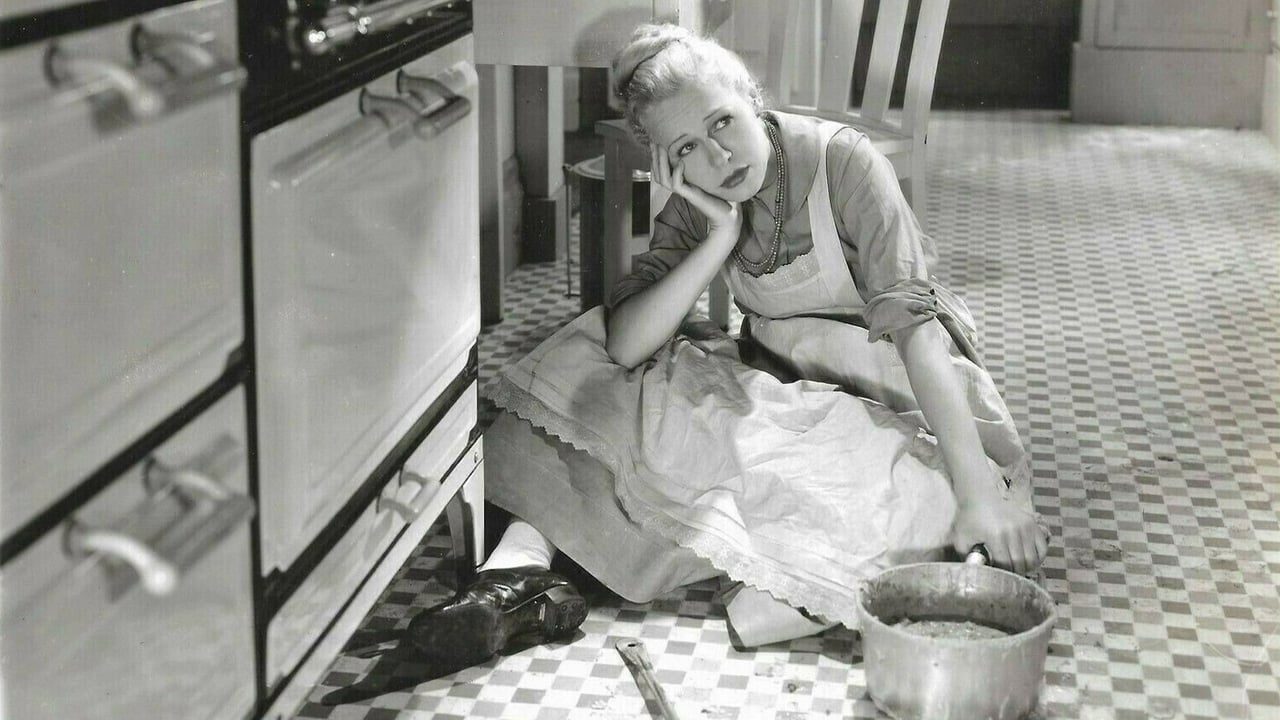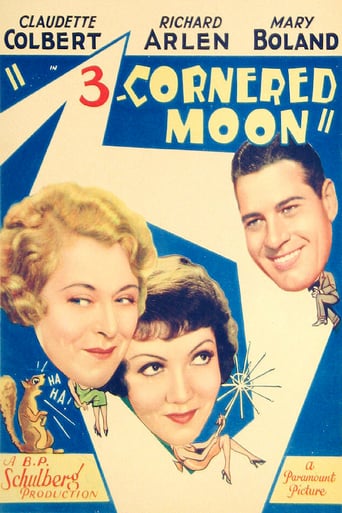

Claudette Colbert leads a strong cast in this tale of a once-wealthy family adjusting to life after the family fortune has evaporated.Mary Boland is excellent as the widowed mother—not really equipped to manage finances, she put all of their money into a failed mine called the Three Cornered Moon and doesn't quite know how to tell the kids they are broke. Colbert is her daughter, engaged to a rather useless aspiring novelist but not afraid to go out and find a job herself.There are also three grown sons, most notably Wallace Ford in an admirable performance as an earnest go-getter with girl trouble who spouts great lines like, "From now on, I'm gonna be absolutely independent of everybody. That reminds me, I gotta ask Mother for some money." Richard Arlen has a key role as a doctor friend of Colbert. Hearing of the family's troubles, he moves right into their house to help them out by contributing some rent and also, it seems, to be around Claudette more.It's a mildly silly comedy, for the most part, but has a couple of serious moments, especially the scene where Colbert finally sees through her deadbeat writer boyfriend (Hardie Albright): "You've failed me!" she gasps, devastated, when he returns home late one afternoon having skipped a job interview and bought her flowers instead.Charming rather than side-splitting, it's a very entertaining family comedy, thanks to excellent characterizations from all.
... View MoreIn DeWitt Bodeen's superb career article on Richard Arlen (Films in Review June/July 1979) he related that Arlen had never wanted to be a star - he was far happier with the roles that Paramount found for him than the "star" roles handed out to others. The "dependables" often had careers as long as they wanted to act - critics could always pan a star but an actor who had a key supporting role was often praised for making the pictures worth watching. This was why, after playing the oldest college footballer (along with Jack Oakie) in movie history in "College Humor", he was immediately cast as Alan Stevens, the affable doctor in "Three Cornered Moon", which actually is the name of the mining stock that loses the family their fortune.This was an early example of the type of nutty comedy that became more popular as the decade progressed. It was all about the zany Rimplegar family who found themselves on the employment line when the Wall Street crash obliterated their wealth. A typical morning at the Rimplegars consists of zany mother Nellie (wonderful Mary Boland) making pancakes in her feathered nightgown ("the children would feel hurt if I didn't wear it") but can't cook them as feisty Jenny (Lyda Roberti) proclaims (all throughout the movie) "go way - the stove, she's mine"!! Where would the movies be without Lyda - at one stage she is told a bunch of flowers is called a George, so whenever she sees a flower she says "George, beautiful George" - she's a scream!!! There is also Kenneth (Wallace Ford) who is having woman trouble, Douglas (William Bakewell), an aspiring actor who is forever rehearsing his line!!! while Elizabeth (Colbert) ponders the meaning of life.She soon finds out as, through their mother's incompetence, they suddenly find themselves broke and desperately in need of jobs. Dr. Stevens walks into their catastrophe and he gives them a lecture on the realities of life and forces them all to look for work. Douglas finds an acting job with an even shorter part - "Yes"!! Young Eddie (Tom Brown), home from college finds a job as a lifeguard while Elizabeth gets one as a machinist but has to fend off her amorous married boss then has to come home to her novelist beau, Ronald (Hardie Albright) who lives in a fantasy world where he compares Elizabeth to a tree. Stevens also helps out the family finances by becoming a boarder (he really just wants to be near Elizabeth) and it is Ronald's frivolous head in the clouds attitude that makes her realise that life is to be lived and striven for and not dreamed away.Of course everything turns out okay but not before a health scare from Eddie (he is working two jobs) brings about a showdown and Ronald, who was living rent free and expected Elizabeth to work to support him, is shown the door.I just loved this movie. Claudette is always excellent in whatever she does, Mary Boland "out zanied" Billie Burke as the addle headed Nellie - "don't yell at me, you know I'm incompetent"!! and the movie would have been not half as good without Lyda Roberti. Hardie Albright was one of a string of young actors (David Manners, Gene Raymond) who came to Hollywood in the early 1930s, touted with much promise. To me, he always looked very intense and was at his best in those darker type of roles ie "The Ninth Guest" (1934) and as the hypocritical Reverend Dimmesdale in "The Scarlet Letter" (1934).
... View MoreGot this 1933 movie from the library. Colbert is charming as are the rest of her family members. She was not yet a STAR, but her star quality is on display. It's frequently a laugh out loud movie. The story line of a daffy matriarch, Mary Boland, who gets wiped out by the stock market crash of 1929 and her 4 adult children who are still living at home, and what they do to survive the crisis makes for a delightful hour or so. The maid/cook whose English is minimal does not add anything to the comedy, but this is a minor fault. I've never previously seen Richard Arlen, who stands on the sidelines, quietly loving Colbert, and was glad to see how at the ending one obviously wrong suitor was replaced for another.
... View MoreIf it weren't for the fact that there are no dead bodies buried in the cellar, the set of the house where 90% of the film takes place looks like the Brewster home from Arsenic And Old Lace. Like the Brewsters the Rimplegars are old Brooklyn money.Head of the clan Mary Boland could easily have been a third Brewster sister. Boland took a patent out on empty headed grand dame roles and what she didn't play Billie Burke and Spring Byington did. Some stock broker sharpie wheedled the family fortune out of her and the 1929 crash did the rest. She and her spoiled children which consist of Claudette Colbert, Wallace Ford, William Bakewell, and Tom Brown all have to make their own way in the world.As does Hardie Albright who was courting Colbert, he figured on a life of ease, but is reevaluating his situation with Joan Marsh. The only person around with any real sense is Richard Arlen who plays a doctor who likes the family and rents a room with them. They get his rent and free medical service, can't beat that during the Depression years.Three Cornered Moon ran for only 57 performances on Broadway in 1933 and playing Claudette's role was Ruth Gordon. Such movie cast names as Brian Donlevy, Elisha Cook, Jr., and John Eldredge were all in the Broadway cast. Though the play has a few laughs you don't really get involved with the Rimplegar family as such. Claudette Colbert had much better comedy roles in her future.
... View More